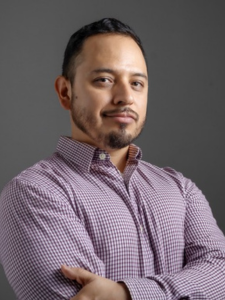Two graduate students in our online Master’s of Science in Big Data Analytics program recently were invited to attend an international conference and present the findings of their research, which focuses on safeguarding women in different regions of the world.
Stephanie Meza and Eduardo Rosas, along with their SDSU faculty advisor Gabriela Fernandez, traveled to Athens, Greece for the One Health International Conference. Meza will complete her graduate program this December, while Rosas is on track to graduate in fall 2025.
We asked the researchers to share more about their work on behalf of women around the globe.

Stephanie Meza, Big Data Analytics Master’s Student
Stephanie Meza
What was the title and primary focus of the research you presented at the conference?
The title of my research is “The CHIARA Project: Addressing Women’s Mental Health and Safety in US-Mexico Border States.” The primary focus of this research is to highlight the urgent issues of sex trafficking and mental health challenges faced by women in the border regions of California, Arizona, Texas, and New Mexico. These areas are characterized by a unique convergence of social, economic, and political factors that create significant vulnerabilities for women, leading to heightened levels of depression, anxiety, and PTSD.
How did you conduct your research and what did you learn during the process?
During my research, I adopted a mixed-methods approach which allowed me to integrate both qualitative and quantitative analyses, providing a comprehensive understanding of how mental health and human trafficking intersect along the US-Mexico border. The research began with a content analysis of media reports, legal documents, and policy papers to understand public perception and the influence of various policies on trafficking. In tandem, I collected and analyzed quantitative data from sources like the National Human Trafficking Hotline and healthcare databases to assess the prevalence of trafficking and mental health disorders such as PTSD, depression, and anxiety among affected women.
I conducted a statistical analysis using R Studio, where I focused on correlating crime rates, mental health disorders, and trafficking incidents across states like California, Arizona, Texas, and New Mexico. This allowed me to visualize trends and identify hotspots where these issues were most severe. The data was thoroughly cleaned and organized, ensuring that the insights drawn were reliable and actionable. What I learned during this process was the complexity of the issues at hand—mental health and human trafficking are deeply intertwined with socioeconomic and political factors, particularly in border regions. I also gained a deeper understanding of how important it is to provide policymakers and community leaders with data-driven insights to inform more effective interventions. This experience not only enhanced my analytical skills but also reinforced the value of interdisciplinary research in addressing multifaceted social issues.
What outcomes are you hoping your research will achieve?
Through the CHIARA Project, we aim to give a voice to those women who have been silenced by the injustices they endure. By utilizing a data-driven approach, including the creation of interactive dashboards and visualizations, we identify hotspots for trafficking and related mental health issues. Our goal is to inform and empower community leaders, policymakers and health care providers with actionable insights to combat these challenges effectively. The research also investigates how border security policies may inadvertently contribute to the prevalence of human trafficking and mental health crises in these regions. By understanding the dynamics at play we hope to develop targeted interventions that not only address immediate needs but also promote sustainable solutions for women’s safety and well-being in the US-Mexico border states.
What was your experience earning your master’s in Big Data Analytics online through SDSU Global Campus?
My experience earning my master’s in Big Data Analytics through SDSU Global Campus has been incredibly rewarding. The program has allowed me to deepen my understanding of advanced AI techniques and data analytics tools while also providing numerous opportunities to apply these skills to real-world problems. One of the most impactful aspects has been integrating my learning into research, where I’ve been able to critically analyze complex issues and develop actionable solutions. The program has challenged me to think more strategically and creatively, equipping me with the tools to tackle data-driven challenges with confidence.
What are your professional plans after you have graduated from SDSU?
After graduating from SDSU’s Big Data Analytics program, my professional goal is to continue building on the research I’ve conducted, particularly focusing on the intersection of data analytics and social issues, such as human trafficking and mental health. I aim to work in a role where I can leverage my skills in AI and advanced analytics to drive data-informed decision-making, whether in a research, governmental, or nonprofit capacity. Ultimately, I hope to collaborate with policymakers and organizations to develop data-driven solutions that tackle critical societal challenges. Additionally, I’m eager to explore opportunities to lead initiatives that apply data analytics to public health and safety, continuing my commitment to using data for positive social impact.

Eduardo Rosas, Big Data Analytics Master’s Student
Eduardo Rosas
What was the title and primary focus of the research you presented at the conference?
My research focuses on evaluating “Leave No One Behind” Sustainable Development Goals (SDG) Indicators for Addressing Women’s Injustices at the US-Mexico and Mediterranean Border.
The study evaluated and measured the “Leave No One Behind” indicators from the United Nations Sustainable Development Goals (UN, 2020) to identify hotspots of environmental, social and economic injustices faced by women in San Diego County, USA, Tijuana, Mexico, and Lampeduza, Italy border.
Tell us how you conducted your research and what you learned during the process
During this research process, I had to explore international databases and surveys to gather the necessary data and provide insights from Tijuana. This was my first experience conducting this type of research, and I was impressed by my ability to gather information from Mexico. Additionally, I found it fascinating to learn how to navigate various international sources and databases.
What outcome are you hoping your research will achieve?
The primary objective of this research is to provide insights and policy recommendations to address the challenges women face in cross-border migration contexts. I hope this study highlights the necessity of collaborative efforts to tackle these pressing issues effectively.
What was your experience earning your master’s in Big Data Analytics online through SDSU Global Campus?
It’s been a challenging experience as I adapt to online learning. However, I keep learning and am doing my best to succeed in this program.
What are your professional plans after you have graduated from SDSU?
I am looking for a job where I can make a difference. I am acquiring valuable skills that I hope to use for social change.